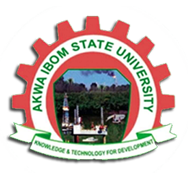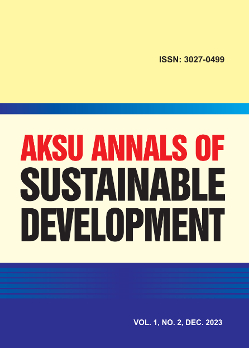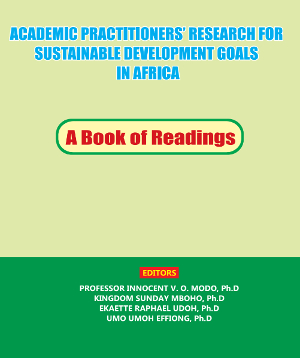THE EFFECT OF GENDER INEQUALITY AND EARLY MARRIAGE ON GIRL-CHILD EDUCATION IN IKOT EKPENE SENATORIAL DISTRICT
Abstract
INTRODUCTION
The recent wave of globalization has greatly improved the lives of women worldwide, particularly the lives of women in the developing nations. Nevertheless, women remain deprived in many areas of life, including education, employment, health and civil rights. According to the U.S. Agency for International Development and the World Bank, 57% of the 72 million primary school aged children
who do not attend school are females. Additionally, girls are 4% less likely than the boys to complete primary schools (Gender statistics, 2010). There is still world-wide gender disparity in education. In most families, there are more female children than male children who are not attending schools.
Generally, girls in the poorest 20% of household have the lowest chance of getting an education this inequality does not necessarily change in adulthood (Nnachi, 2010). Statistics showed that the 774 million illiterate adults worldwide, 64% are women, the figures
virtually unchanged from the early 1990s. The United Nations Millennium Development Goal (MDG) to promote gender equality and empower women therefore uses education as its target and the measure of gender disparity in education as its indicator of progress. Through the efforts of the international community, the UN hopes to eliminate gender disparity in primary and secondary education in all levels of education no later than 2020 but this was abortive (Gender Statistics, 2010).
This brought about the questions: Can this Sustainable Development Goal be achieved? What progress have countries made to achieve this goal? And specifically, how far has Nigeria as a nation gone to meet this goal? Nigeria is still among the nations facing many challenges in reaching that target by 2030 as well bridging gender gap in primary, secondary and tertiary education. It is
imperative to say that education plays an important role as a foundation for girls‟ development towards adult life. At the time ensuring gender equality requires adapting equally to the needs and interests of girls and boys. International human rights law lays down a three-fold set of criteria whereby girls should have an equal right to education, and their rights should be protected and promoted through education (Obanya 2007).
Downloads
References
Abdulazeez, M. (2004), Women Education; Problems and Challenges. Journal of Women in Colleges of Education, 8, 14-17.
Akpan C. S. & Effiong U. U. (2021). Communication and Social Inclusion Advocacy for Persons with Disabilities in Akwa Ibom State, Nigeria. The International Journal of African Language and Media Studies, 1 (1), 60-75.
Alibi, T. and Alabi, O. (2012). Child labour amongst urban poor in Lagos and Abuja. Journal of Peace, Gender and Development, 2(3).
Asare, K. (2009), Ghana: Quality Education crucial to end girl child labour. http://allafrica.com/stories/200906151025.html.
Braun J., Swarminthan M and Rodegrant M (2004). Agriculture, Food Security, Nutrition and the Millennium Development goals. 5th Report on the world Nutrition situation, Geneva.
Charles, O. and Charles, A. (2004). Family and Child Labour: A study of child Hawkers in Calabar. Journal of social A Development in Africa 19(2), 133 – 131
Daniel. O. (2010). Displacing Gender inequality through Odi: THE National Open University of Nigeria English Programme as a potential Tool. Paper presented at the sixth pan-common –wealth Forum on learning, India. November, 1-2.
Effiong, U. U. (2019). Gender and Health Inequalities amongst Rural Women with Disabilities in Ikot Ekpene Local Government Area of Akwa Ibom State. Akwapoly Journal of Communication and Scientific Research, 4(1), 88-103.
Fatimayin, F. (2004) Literacy and reading for pleasure. Literacy and reading in Nigeria 10 (1), 149-152
Federal Government of Nigeria (2004). Nationality Policy on Education. Government Press, Abuja.
Federal Ministry of Education (2006). Basic and Senior Secondary Education Statistics in Nigeria and 2005. USAID
Federal Ministry of Education (2006). in National & Bereau of Statistics Annual Abstract of Statistics
Federal Ministry of Education. (2000). Implementation Guidelines for the UBE Programme. Abuja, Government press.
Francis, J. (2000). Investing in Children‟s Future: Enhancing the Educational Arrangement of looked after Children and Young people. Child and family social work, 5:23-33
Giddens, A. (2010). Sociology (6th ed). John Wiley and Son.
Guttaman Cynthia. When Girls go missing from school. http://www.id21.org.An.
Haralambo, M and Holbora, M. (2000). Sociology: Themes and Perspectives. Herper Collins Publisher Limited.
Ibrahim, J. (2004). The First Lady Syndrome and the Marginalization of Woman from power Opportunities or Compromises for Gender Equality (1). Feminist Africa, Issue 3.
Igbokwe, G. (2011). Teaching, an Endangered Profession. Punch Opinion. February 14, 12
Igube, R. (2007). Micro and Small Scale Entrepreneurship as a Tool for the Economic Empowerment of Women: Abuja Journal of Sociological Studies, 3(1), 1595-577.
Igube, R. (2010). Women and Gender Studies: Sir Kuf Venture Limited.
Igube, R.B. (2004). Gender Security and Advancement: The case of inequality and Inequity. Paper presented at the Round Table Discourse by Higher Link Educational Programme. The British Council, Change Managers International, University of Abuja
Mwangi, E (2004). News and Views from Africa. http//www.news from Africa /indices/index1707.html.Retrieved2/6/09 Nigerian Census – Gender Population. (2007 www.nigerianpolity.blogspot.com/2007/01
Nnachi, R. (2010) Gender Equity in Education: A challenge to school system In the igbo speaking states of Nigeria. in JONAED 6(1), 105-115
Ocho l.. (2005). Issues and concerns in education and life. Institute of Development Studies, University of Nigeria Nsukka.
Offorma, G. (2008). The boy - child Education in the South Eastern States of Nigeria : Problems and prospects. Paper presented at the convention of unity schools old students association (USOSA), held at Dannic Hotel, Enugu.
Ofoegbu I. (2009). Female Access to Basic Education: A case for Open Distance Learning. Edo Journal of Counseling, 2(1), 46.
Ogundipe, M. (2007). Indigenous and contemporary concept and issues in Africa: implication for Nigeria‟s Development. CBAAC Occasional Monography, No. 2. Mathouse Press Limited
Ohiri-Aniche, C. (2002). Gender Issues in Education. In: The state of Education in Nigeria. UNESCO. 52-69.
Okebukola, F. (2002). Children‟s Emergent Reading: From theory to practices in literacy and reading in Nigeria, 10(1), 9.
Okoro, D. (2002). Basic Education - emerging issues, Challenges and constraints. In: The states of Education in Nigeria. UNESCO, 36
Onukaogu, C. (2002). Reading for the Attainment of sustainable National Development. Literacy and Reading in Nigeria, 9 (1), 287
Tahir, G. (2005). The Universal Basic Education in Nigeria. The journey so far. Nigeria journal of Teacher Education and Teaching, 1(10), 217-221.
UNICEF Report (2001). Education and Gender Equity Retrieved 20/3/2011. www.unicef.org/educ/UNICEF (2003). The states of the world‟s children. UNICEF.
UNICEF (2004), (2006) Reports. State of the World Children.
Downloads
Published
Issue
Section
Categories
License
Copyright (c) 2024 AKSU Annals of Sustainable Development

This work is licensed under a Creative Commons Attribution-NonCommercial-NoDerivatives 4.0 International License.
Manuscript content on this site is licensed under Creative Commons Licenses. Authors wishing to include figures, tables, or text passages that have already been published elsewhere are required to obtain permission from the copyright owner(s) for both the print and online format and to include evidence that such permission has been granted when submitting their papers. Any material received without such evidence will be assumed to originate from the authors.





 ICIDR Publishing House
ICIDR Publishing House